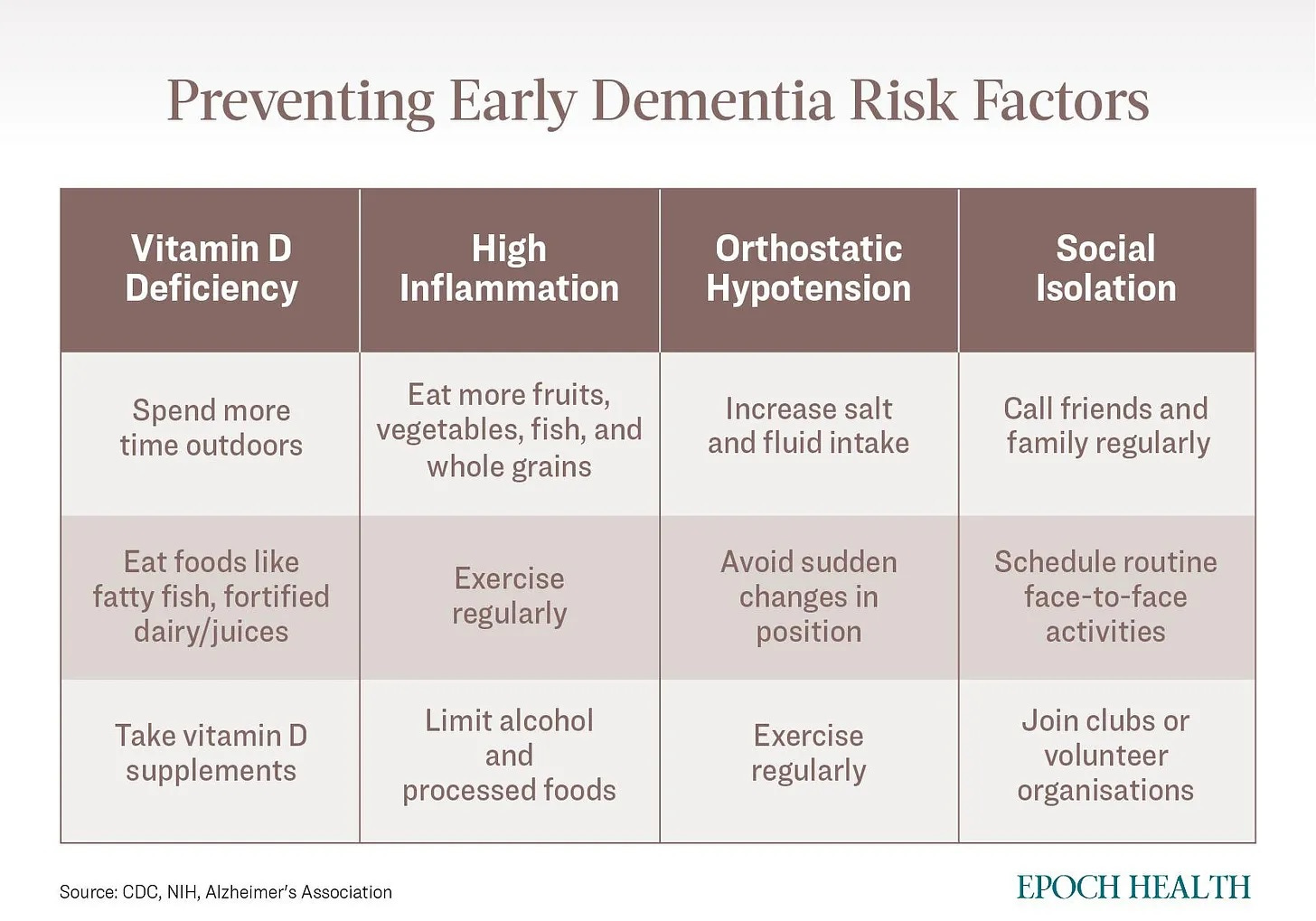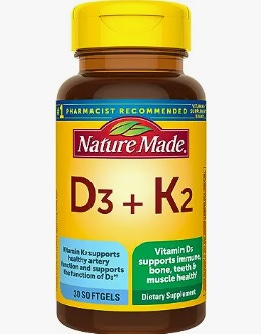January 22, 2024 | Health Prepping, Part 4: Vitamin D Seems To Prevent Dementia

Vitamin D pops up in pretty much every general discussion of health maintenance and disease prevention. Having enough of it seems to help while having too little seems to cause — or at least associate with — everything from cancer to heart disease. So keeping lots of vitamin D in one’s bloodstream is kind of a no-brainer.
The reason I’m posting this now is that new research just linked a lack of this nutrient to dementia, which we baby boomers really, really want to avoid. So here’s an overview (drawn from various sources including ChatGPT), followed by the dementia findings and a couple of tips:
Vitamin D is a fat-soluble vitamin that comes in two main forms: D2 (ergocalciferol) and D3 (cholecalciferol). Vitamin D3 is synthesized in the skin upon exposure to ultraviolet B (UVB) radiation from sunlight, while vitamin D2 is obtained from dietary sources.
Key functions of vitamin D include:
- Calcium and Phosphorus Regulation: Vitamin D helps regulate the absorption of calcium and phosphorus in the intestines, promoting bone health and mineralization, thus staving off rickets in children and osteoporosis in adults.
- Immune System Support: Vitamin D is involved in modulating the immune system, and its deficiency has been linked to an increased susceptibility to infections and autoimmune diseases.
- Cell Growth and Differentiation: Vitamin D is implicated in the regulation of cell growth, differentiation, and apoptosis (programmed cell death).
- Cardiovascular Health: Some research suggests that vitamin D may have a role in maintaining cardiovascular health by influencing blood pressure regulation and reducing the risk of cardiovascular diseases.
- Mood and Mental Health: Vitamin D may play a role in mood regulation, and its deficiency has been associated with conditions like seasonal affective disorder (SAD).
Sources of vitamin D include:
- Sunlight: Exposure of the skin to sunlight is a natural way to synthesize vitamin D. However, factors such as geographic location, time of day, skin pigmentation, and the use of sunscreen can affect the production of vitamin D from sunlight.
- Diet: Some food sources of vitamin D include fatty fish (e.g., salmon, mackerel), fortified dairy products, fortified cereals, and egg yolks.
- Supplements: Vitamin D supplements are also available and may be recommended for individuals who have limited sun exposure or are at risk of deficiency.
The Dementia Connection
Excerpted from the Epoch Times:
Vitamin D Deficiency Linked to Higher Risk of Early Onset Dementia
New research identifies 15 factors tied to increased risk of early-onset dementia.
Forgetfulness and confusion, once considered normal signs of aging, are now increasingly striking adults at the peak of their careers. Rates of early-onset dementia and Alzheimer’s disease among Americans younger than 65 have inexplicably doubled between 2013 and 2017, according to data from Blue Cross Blue Shield, a health insurance provider.
Now, new research identifies vitamin D deficiency, which affects 35 percent of adults in the United States, among 15 adjustable lifestyle factors that appear to drive up a person’s early dementia risk. While the findings also highlight alcohol abuse and isolation, the surprising link between low vitamin D levels and early cognitive decline suggests a simple daily supplement may help the fight against this baffling rise.
Largest Study of Its Kind
The average age of someone between 30 and 64 years old living with either young-onset dementia or Alzheimer’s is 49, with women being disproportionately affected compared to men, according to the BCBS data.
In a recent large-scale study published in JAMA Neurology, researchers identified 15 lifestyle and health risk factors associated with early-onset dementia. The study analyzed information from over 356,000 people younger than 65 whose data were in the UK Biobank, a large-scale biomedical database and research initiative in the United Kingdom, between 2006 and 2010.
“This is the largest and most robust study of its kind ever conducted,” David Llewellyn of the University of Exeter said in a press statement. It is also the first to suggest people can take actions to reduce their risk of the condition by targeting an array of different factors, he added.
Risk Factors for Young-Onset Dementia
“Young-onset dementia has a very serious impact, because the people affected usually still have a job, children, and a busy life,” Stevie Hendriks from the Department of Psychiatry and Neuropsychology at Maastricht University in the Netherlands and lead author of the study said in the statement. “The cause is often assumed to be genetic, but for many people we don’t actually know exactly what the cause is.”
Major contributing risk factors included alcohol abuse, stroke, and hearing impairment—all previously identified as risks for cognitive decline.
However, the study also identified some additional risk factors associated with early-onset dementia that have not been previously explored in depth, including vitamin D deficiency, high levels of inflammatory C-reactive proteins, specifically in women, orthostatic hypotension (low blood pressure that happens when standing after sitting), and social isolation.
Vitamin D Reduced Dementia Risk by 40 Percent
Previous epidemiological studies have also linked vitamin D deficiency with an increased risk of dementia, Claire Sexton, senior director of scientific programs and outreach at the Alzheimer’s Association, told The Epoch Times.
Related Stories
Drinking These 3 Types of Beverages Increases the Risk of Dementia 1/4/2024
Sedentary Behavior Linked to Dementia and Shortened Lifespan: 4 Exercises Can Help 1/2/2024
However, relatively few studies have specifically examined risk factors for young-onset dementia, making Ms. Hendriks and team’s study “a welcome addition to the literature,” Ms. Sexton said.
One relevant study, published in the Alzheimer’s Association’s journal Alzheimer’s & Dementia: Diagnosis, Assessment & Disease Monitoring, compared dementia onset between people who took vitamin D supplements versus those who did not. The study included 12,388 Americans without a dementia diagnosis at baseline, with an average age of 71.
The study found that among those who developed dementia within 10 years, about 75 percent were non-supplement takers compared to only 25 percent who took vitamin D supplements. Supplementation provided greater protection for women, though it reduced dementia risk in both sexes.
Interestingly, the study found vitamin D seemed to offer more benefit if people supplemented it before there were signs of cognitive problems. “Vitamin D effects were significantly greater in females versus males and in normal cognition versus mild cognitive impairment,” the authors wrote.
Overall, the researchers associated vitamin D supplementation with a 40 percent lower incidence of dementia compared to no supplementation.

Two Final Tips
Taking vitamin D with vitamin K seems to improve the former’s uptake, so consider a supplement that combines the two.

Sardines, meanwhile, are a good source of vitamin D, and Costo has them in six packs. They go on sale frequently (my wife and I now have what looks like a lifetime supply in the pantry):

Other Articles In This Series
Health Prepping, Part 1: Stem Cell Breakthrough
STAY INFORMED! Receive our Weekly Recap of thought provoking articles, podcasts, and radio delivered to your inbox for FREE! Sign up here for the HoweStreet.com Weekly Recap.
John Rubino January 22nd, 2024
Posted In: John Rubino Substack
Next: Clamp Down on Short-Term Rentals »











